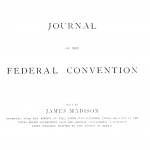 June 2, 1787
June 2, 1787
Today, the delegates decided that the Executive should be elected by the legislature for one seven year term. Benjamin Franklin made an passionate appeal not to pay the Executive a salary but his motion was postponed.
Regarding expressed influences on the content of the Constitution, the Bible and Christianity again didn’t explicitly come to bat. However, some who are inclined to see interpret the founders as expressing Christianity in coded messages might see an influence in Franklin’s speech (a paper read by delegate James Wilson) opposing a salary for the chief executive (what became the office of the president).
Sir, there are two passions which have a powerful influence on the affairs of men. These are ambition and avarice; the love of power, and the love of money. Separately each of these has great force in prompting men to action; but when united in view of the same object, they have in many minds the most violent effects. place before the eyes of such men a post of honour that shall at the same time be a place of profit, and they will move heaven and earth to obtain it. The vast number of such places it is that renders the British Government so tempestuous. The struggles for them are the true sources of all those factions which are perpetually dividing the Nation, distracting its councils, hurrying sometimes into fruitless & mischievous wars, and often compelling a submission to dishonorable terms of peace.
Although Franklin didn’t cite I Timothy 6:10 – “For the love of money is the root of all evil: which while some coveted after, they have erred from the faith, and pierced themselves through with many sorrows.” – he did use a phrase from the verse. Overtly, however, he referenced the problems experienced in the British government rather than use a religious foundation.
Franklin invoked history and more specifically cited the Egyptian Pharoah
Hence as all history informs us, there has been in every State & Kingdom a constant kind of warfare between the Governing & Governed: the one striving to obtain more for its support, and the other to pay less. And this has alone occasioned great convulsions, actual civil wars, ending either in dethroning of the Princes or enslaving of the people. Generally indeed the ruling power carries its point, the revenues of princes constantly increasing, and we see that they are never satisfied, but always in want of more. The more the people are discontented with the oppression of taxes; the greater need the prince has of money to distribute among his partizans and pay the troops that are to suppress all resistance, and enable him to plunder at pleasure. There is scarce a king in a hundred who would not, if he could, follow the example of Pharoah, get first all the peoples money, then all their lands, and then make them and their children servants forever. It will be said, that we don’t propose to establish Kings. I know it. But there is a natural inclination in mankind to Kingly Government.
I believe the mention of Pharaoh would have conjured up images of Old Testament stories of Jewish slavery and redemption. Here Franklin used biblical imagery as illustration rather than blueprint.
So where did Franklin go for his recommendations about proper policy?
The high Sheriff of a County in England is an honorable office, but it is not a profitable one. It is rather expensive and therefore not sought for. But yet, it is executed and well executed, and usually by some of the principal Gentlemen of the County. In France the office of Counsellor or Member of their Judiciary Parliaments is more honorable. It is therefore purchased at a high price: There are indeed fees on the law proceedings, which are divided among them, but these fees do not amount to more than three per Cent on the sum paid for the place. Therefore as legal interest is there at five per Ct. they in fact pay two per Ct. for being allowed to do the Judiciary business of the Nation, which is at the same time entirely exempt from the burden of paying them any salaries for their services. I do not however mean to recommend this as an eligible mode for our Judiciary department. I only bring the instance to shew that the pleasure of doing good & serving their Country and the respect such conduct entitles them to, are sufficient motives with some minds to give up a great portion of their time to the Public, without the mean inducement of pecuniary satisfaction.
Franklin looked to local offices in England and judges in France where service to country is sufficient to attract people of high quality.
Taking an example from his home state, Franklin then extolled the virtues of service as found in the Quaker tradition.
Another instance is that of a respectable Society who have made the experiment, and practiced it with success more than an hundred years. I mean the Quakers. It is an established rule with them, that they are not to go to law; but in their controversies they must apply to their monthly, quarterly and yearly meetings. Committees of these sit with patience to hear the parties, and spend much time in composing their differences. In doing this they are supported by a sense of duty, and the respect paid to usefulness. It is honorable to be so employed, but it was never made profitable by salaries, fees, or perquisites. And indeed in all cases of public service the less the profit the greater the honor.
Franklin then paid George Washington a compliment by using him as an example of someone who served without salary.
Despite Franklin’s good reputation and use of biblical imagery, the motion was politely postponed without debate. Madison wrote:
The motion was seconded by Col. Hamilton with the view he said merely of bringing so respectable a proposition before the Committee, and which was besides enforced by arguments that had a certain degree of weight. No debate ensued, and the proposition was postponed for the consideration of the members. It was treated with great respect, but rather for the author of it, than from any apparent conviction of its expediency or practicability.
Other influences referred to in this session include “antient republics.” Lauding state governments, Dickinson said:
If antient republics have been found to flourish for a moment only & then vanish forever, it only proves that they were badly constituted; and that we ought to seek for every remedy for their diseases. One of these remedies he conceived to be the accidental lucky division of this country into distinct States; a division which some seemed desirous to abolish altogether.
On the question of how many people should hold the position of Executive, delegate Butler said:
He said his opinion on this point had been formed under the opportunity he had had of seeing the manner in which a plurality of military heads distracted Holland when threatened with invasion by the imperial troops. One man was for directing the force to the defence of this part, another to that part of the Country, just as he happened to be swayed by prejudice or interest.
Heterodox Ben Franklin was the first to hint at Christianity to illustrate a point he wished to make. While interesting as a matter of rhetoric, his warning about “love of money” and use of the Quakers as a positive example cannot be seen as a blueprint for governance from the Bible.
 On June 2, 1787, PA delegate James Wilson read a paper written by the elder statesman of the Constitutional Convention, Benjamin Franklin, which made a case against paying the chief executive a salary. While Franklin thought the executive should be reimbursed for expenses incurred while serving, he did not believe a salary would bring out the best candidates. In fact, he was direct about the kind of people who would seek an office promising power and money.
On June 2, 1787, PA delegate James Wilson read a paper written by the elder statesman of the Constitutional Convention, Benjamin Franklin, which made a case against paying the chief executive a salary. While Franklin thought the executive should be reimbursed for expenses incurred while serving, he did not believe a salary would bring out the best candidates. In fact, he was direct about the kind of people who would seek an office promising power and money.